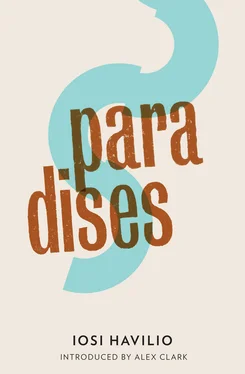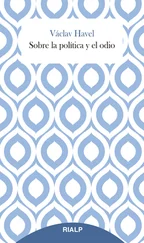Iosi Havilio - Paradises
Здесь есть возможность читать онлайн «Iosi Havilio - Paradises» весь текст электронной книги совершенно бесплатно (целиком полную версию без сокращений). В некоторых случаях можно слушать аудио, скачать через торрент в формате fb2 и присутствует краткое содержание. Год выпуска: 2013, Издательство: And Other Stories, Жанр: Современная проза, на английском языке. Описание произведения, (предисловие) а так же отзывы посетителей доступны на портале библиотеки ЛибКат.
- Название:Paradises
- Автор:
- Издательство:And Other Stories
- Жанр:
- Год:2013
- ISBN:нет данных
- Рейтинг книги:3 / 5. Голосов: 1
-
Избранное:Добавить в избранное
- Отзывы:
-
Ваша оценка:
- 60
- 1
- 2
- 3
- 4
- 5
Paradises: краткое содержание, описание и аннотация
Предлагаем к чтению аннотацию, описание, краткое содержание или предисловие (зависит от того, что написал сам автор книги «Paradises»). Если вы не нашли необходимую информацию о книге — напишите в комментариях, мы постараемся отыскать её.
is an almost perfect novel." — Albert Camus's
reimagined with a female lead in in twenty-first-century Buenos Aires.
Recently widowed, a young woman leaves the countryside for Buenos Aires with her four-year-old son where she seeks to build a new life for herself. She finds work in the zoo and moves into the human zoo of a squatted tower block at the invitation of one of its residents, to whom she acts as nurse, giving morphine injections.
Paradises — читать онлайн бесплатно полную книгу (весь текст) целиком
Ниже представлен текст книги, разбитый по страницам. Система сохранения места последней прочитанной страницы, позволяет с удобством читать онлайн бесплатно книгу «Paradises», без необходимости каждый раз заново искать на чём Вы остановились. Поставьте закладку, и сможете в любой момент перейти на страницу, на которой закончили чтение.
Интервал:
Закладка:
We have hard-boiled eggs and rice with peas for lunch. Simón eats the whites, I always preferred the yolks. There is a lot of traffic in the kitchen this lunchtime, like breakfast but even busier. A never-ending rotation of people, noises and smells. In addition to the Spaniard, who comes in and out all the time, very nervous, a notebook in one hand and her mobile in the other, people I’ve never seen parade past: one opens the fridge, another turns on the grill for a steak, a third sits at the table to do sums on a calculator with giant buttons. The radio is constantly on in the background. The news of the day is that a helicopter went off-course near Magdalena and has now disappeared off the radar. At one o’clock we go out and at half one I meet Iris at the entrance to the zoo to swap over. Next to the photographer with the pony, as always, as if we had agreed on it. Simón doesn’t complain, he appears to have adapted quickly to the new routine.
The worst is about to come, prepare yourself, Yessica tells me in lieu of a greeting. And I don’t need to ask her why, she immediately points towards the entrance, sweeping the terrace with her index finger in the air. It’s the start of the holidays. But despite Yessica’s foreboding, the constant mechanical activity, the hundreds of tickets I check and the many faces I see without really looking at any of them all distract me. You hear the children, but after a while you tune them out and their shouts seem natural.
So far, in the week and a bit I’ve been working, I haven’t had any major difficulties. Only small issues. It’s been hard to familiarise myself with the walkie-talkie system: when someone speaks to me I can’t hear it, and when I manage to respond, they’re looking for someone else. The only incident takes place with a group of corpulent Brazilians who don’t want to understand that the ticket they bought doesn’t include entry to the reptile house. I point out a hut where they can buy the supplementary ticket but as they move on, their hand gestures tell me to go to hell. Yessica shows solidarity, she hates foreigners. They really rile me, that’s what she says.
It becomes a habit to take my break with Canetti. An enforced habit, the guy comes looking for me, he latches on to me and I can’t avoid it, I’m a new arrival. He’s a strange man, with many problems. As well as his limp and his lazy eye, from time to time, without warning, maybe because of nerves, maybe it’s the heat, he is gripped by a trembling in his fingers that prevents him from holding his broom. He has to wait for it to pass, then he shakes out his hands, rubs them against the grass or the bark of a tree. Localised epilepsy. After-effects, he tells me on one of the first days; I am intrigued. An accident, a brain haemorrhage, the war? I don’t know, it could be any of them, I can’t work it out. We usually sit on a bench behind the photographers’ booth. He smokes a cigarette, sometimes two, and I listen to him in silence, looking straight ahead towards the lake. Some days the jets of water are turned on, other days they aren’t, it depends. I don’t understand the logic behind it.
One afternoon Canetti tells me his story with a bag of crisps in his hand, which he offers me every so often and which I refuse every time. He says he shouldn’t be working any more, he retired nine years ago but he doesn’t get a peso. Canetti was a treasurer in an important bank, he stresses the word important with a raised eyebrow. Twenty-eight years grafting in the same office, from the age of nineteen. I was office junior, clerk, account executive, then cashier and finally head of the treasurer’s office. He had his own property, which he had bought with a special credit for bank employees, quite a nice little flat in the city centre with a balcony and garage, occasionally he got away to the seaside or into the hills with his wife, he couldn’t complain. Cinema, theatre, restaurants, always some little outing on a Friday night. Until his mother died and he was overcome by terrible depression. My world came tumbling down, I wasn’t ready for anyone to die, especially not Mum. Listening to him, I don’t understand why he’s telling me all this, given that we barely know each other, but I can’t stop him, he’s getting sentimental. The thing is that he started to drink, boozing he says, he went to bed late, missed work, didn’t wash. Really bad, basically. So, wanting to help him, his wife put him in touch with a psychologist she knew from school. The guy sees him a couple of times in his office and suggests that it’s not his mother he’s stressed about but his job. Even though he wasn’t entirely convinced, it was clear to Canetti that taking a holiday would be good for him in his condition and he went along with it. But they became bolder and what was initially going to be a request for stress-related leave eventually resulted in an application for early retirement due to psychological incapacity. The man told him treasurers are under a lot of pressure because they deal with such large quantities of money and he reckoned Canetti could claim a decent amount of compensation to cover the costs of treatment and retirement. The arrangement was that he would give a percentage to the psychologist as his fee. Despite his state, but also largely infected by his wife’s enthusiasm, Canetti allowed himself to be led. Worst mistake of my life, he says, lighting a fresh cigarette, but the move had already been played. So the preparations began for him to pass the medical exams. I had to arrive at the interviews in the most broken state possible for them to believe me. He spent six months barely working, devoted to turning to shit, that’s what he says. He barely slept, he was mixing drugs, tranquillisers, cocaine, alcohol, he slashed his face, he burnt his palms with lighters. He shows me some scars. This was all part of the plan to convince the psychiatrists from the insurance company. And in spite of his doubts, it all went quite well. He even managed to get admitted to a clinic for a couple of weeks, to make the situation more believable. He appeared before the various insurance committees without raising suspicion. One of those sleepless nights after going too far, I slipped in the shower, I damaged myself permanently, he says, showing me the leg that drags when he walks. The fact is that after a multitude of tests, sessions, clinical analyses and about twenty doctors along the way, his incapacity was certified.
Everything went ok, I received the first two instalments, I paid the guy his share, I even took a trip to the coast, but in two weeks I was sent a registered letter, an official one. The lawyer from the insurance company had discovered that the psychologist was involved in a lawsuit for having given a false diagnosis. Confronted with the evidence, Canetti confessed, accusing the man of having incited him to commit the crime, but they had no sympathy. That’s what he says, his mouth full of smoke: They had no sympathy. They threw me out of the bank without paying me a single peso and started criminal proceedings for fraud, which are still going on. When she found out, my wife wanted nothing to do with it and I didn’t have the will to keep fighting. And the worst thing is that, I don’t know how he managed it, but the guy went and moved to Brazil. I was fucked, truly fucked, he says. As Canetti falls silent and I look into his eyes, sad, broken eyes like an orphaned, tortured cat’s, I don’t know what to say to him, I’m left hanging on the last word he said, that Brazil that echoes through me, carrying distant memories. I sympathise in silence, with my eyebrows, all the words of consolation that occur to me turn out to be impossible to articulate. He realises this and must feel a bit disappointed.
Suddenly, because it’s a certain time, or in order to receive the last wave of visitors, or because whoever operates them happens to be in the mood, the jets of water in the centre of the lake are turned on, more powerful than ever. Flicking it hard with his index finger, Canetti throws down the stub of his cigarette, which lies smoking in the grass. Annoyed, he stands up and limps to the ember, which he stamps on, twisting his shoe. Then he turns round and says to me: Do you know how to give injections? I shrug, believing that I know, or rather that I would be able to do it. He insists: But you’ve done it before? I answer Yes, assuming that he’s talking about animals: dogs, cats, horses. Even a hamster. Well, says Canetti, it must be the same, flesh and bone, yeah? He explains two drags of a cigarette later. Where he lives, a building some ten blocks from the zoo, there’s a lady, the building manager or something along those lines, a very ill old lady who needs two injections a day. Are you up for it? Canetti presses me: It could be a few extra bob. If you like, we’ll go there together tomorrow afternoon and I’ll introduce you, then it’s between the two of you. Somehow I accept, I can’t see why not. On the way to the reptile house, I glance at him. He moves away, dragging the broom towards the bower. He whistles and limps in a regular counterpoint; in fact, everything about him is harmoniously disjointed. When he’s not talking, I’m starting to realise, Canetti is smoking or whistling. I struggle to imagine him in his former life, in the bank, counting notes, married, with his wife, armchair and holidays. Even harder to imagine all the effort he put into passing as insane.
Читать дальшеИнтервал:
Закладка:
Похожие книги на «Paradises»
Представляем Вашему вниманию похожие книги на «Paradises» списком для выбора. Мы отобрали схожую по названию и смыслу литературу в надежде предоставить читателям больше вариантов отыскать новые, интересные, ещё непрочитанные произведения.
Обсуждение, отзывы о книге «Paradises» и просто собственные мнения читателей. Оставьте ваши комментарии, напишите, что Вы думаете о произведении, его смысле или главных героях. Укажите что конкретно понравилось, а что нет, и почему Вы так считаете.











